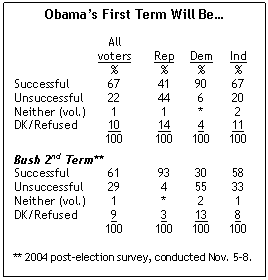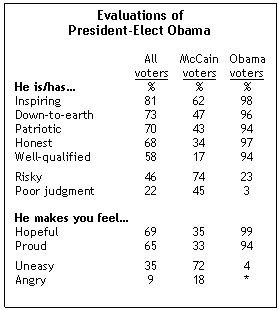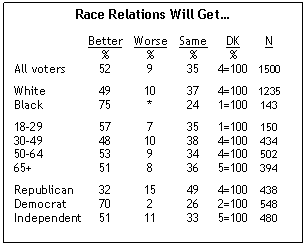High Expectations for Obama’s First Term
Two-thirds of voters (67%) expect Obama to have a successful first term, while only 22% think the new president will be unsuccessful. Nearly all Democrats (90%) are optimistic about Obama’s first term, as are 67% of independent voters. Republicans are nearly evenly divided; 41% believe Obama’s first term will be successful and 44% say it will be unsuccessful.

Voters are somewhat more upbeat about the prospects for Obama’s first term than they were four years ago about George W. Bush’s second term. After the 2004 election, 61% expected Bush to have a successful second term, while 29% predicted an unsuccessful second term. Democrats were particularly pessimistic in 2004: More than half (55%) thought Bush would be unsuccessful. Republicans, on the other hand, were about as confident that Bush’s second term would be a success as Democrats are about Obama’s first term.
While those who voted for Obama express the same level of optimism about his first term as Bush voters did about their candidate’s second term (92% and 94%, respectively), McCain voters are much more positive about Obama’s first term than were Kerry voters about Bush’s second term. Currently, 39% of McCain voters say they expect Obama to be successful, compared with 26% of Kerry voters who said the same about Bush.
Obama Inspiring to Most Voters

Majorities of voters view Obama as inspiring (81%), down-to-earth (73%), patriotic (70%), honest (68%), and well-qualified (58%). The percentages saying that each of these traits apply to Obama is higher than it was in the weeks leading up to the election. Most also say the president-elect makes them feel hopeful (69%) and proud (65%). However, a sizable minority continues to see Obama as risky (46%) and more than one-third say that he makes them feel uneasy (35%).
Nearly three-quarters of McCain voters describe Obama as risky (74%), and about the same proportion says he makes them feel uneasy (72%). Even among those who voted for Obama, nearly a quarter say their chosen candidate is risky (23%), though very few (4%) say he makes them feel uneasy. Obama voters nearly unanimously say the president-elect makes them feel hopeful (99%) and proud (94%), sentiments that are echoed by about a third of those who voted for McCain (35% feel hopeful and 33% feel proud).

Overall, the feelings Obama elicits from voters are far more positive than they were early in the campaign, and the change is most notable among Democrats. Fully 92% of Democratic voters say Obama makes them feel proud, up from 60% in March, when Obama was competing with Hillary Clinton for their party’s nomination. Democrats are also much more likely to say the president-elect makes them feel hopeful (96% vs. 72% in March) and considerably less likely to say he makes them feel uneasy (7% vs. 25% in March).
More Republican and independent voters also say Obama makes them feel proud and hopeful than did so in March. However, 68% of Republicans say the next president makes them feel uneasy, compared with 62% in March; the percentage of independents who express this view is virtually unchanged (36% in the current poll vs. 39% in March).
But one reaction to Obama that has dissipated almost entirely is anger. In March, roughly a quarter (26%) of registered voters said that Barack Obama made them feel angry, and this sentiment was shared by 37% of Republicans, 26% of independents and 18% of Democrats. Today, just 9% of voters say Obama makes them feel angry, including 17% of Republicans, 8% of independents, and 2% of Democrats.
Optimism about Race Relations

A majority of voters (52%) believe that Obama’s election as president will lead to better race relations in the United States; just 9% think race relations will get worse, while 35% say it will not make a difference. African Americans are especially optimistic about the future of race relations; fully three-quarters of black voters say race relations will improve now that Obama has been elected president, compared with 49% of white voters.
When asked if, before the campaign started, they thought the country would elect an African American as president in their lifetime, a narrow 52% majority says they thought it would happen while 42% say they did not think so. Just a quarter of black voters say that, before the campaign, they thought an African American would be elected president; many more white voters (56%) express this view. Voters over 65 were less confident prior to this campaign that this would be achieved in their lifetime (36%), while a majority of voters under 65 thought it would.

The election of the first African American as president and the widespread support Hillary Clinton garnered in the Democratic primaries have contributed to the impression among voters that the country will elect a female president in the future. Fully 85% say they think this will happen in their lifetime while just 12% say it will not. By comparison, a 1996 Newsweek poll showed the public much less confident, with 54% saying they thought a woman would be president in their lifetime and 43% saying it would not happen.
Overwhelming majorities of voters across demographic and partisan groups expect the country to elect a female president in their lifetime. More than eight-in-ten women (82%) and men (87%) think it will happen. Three-quarters of those 65 and older also say a woman will be elected president in their lifetime, as do even larger majorities of younger voters.




